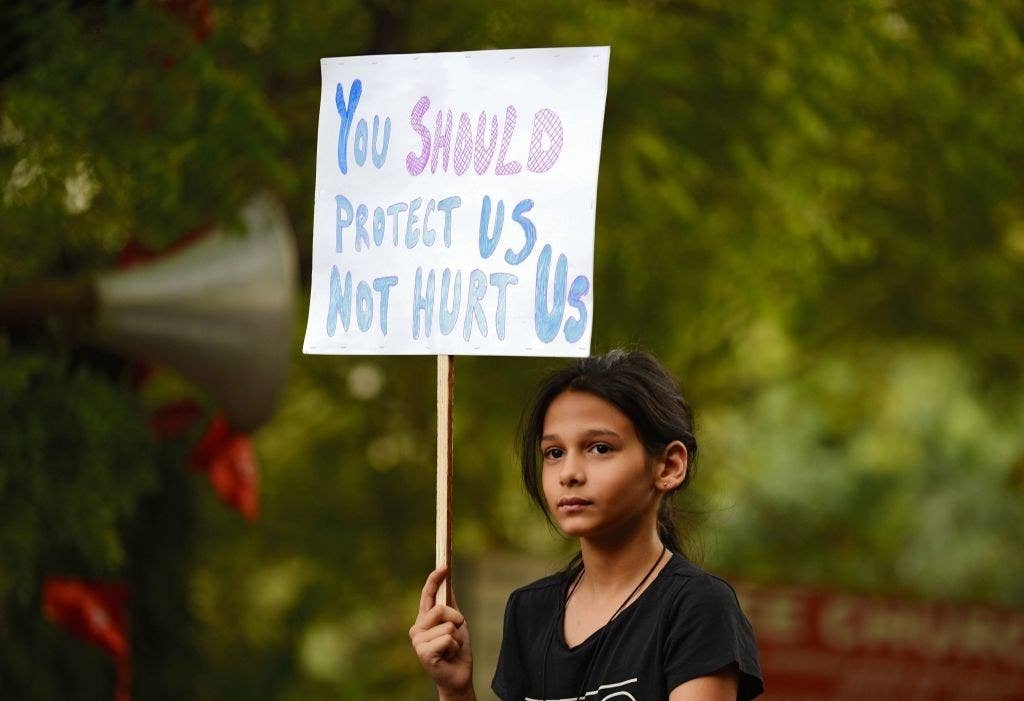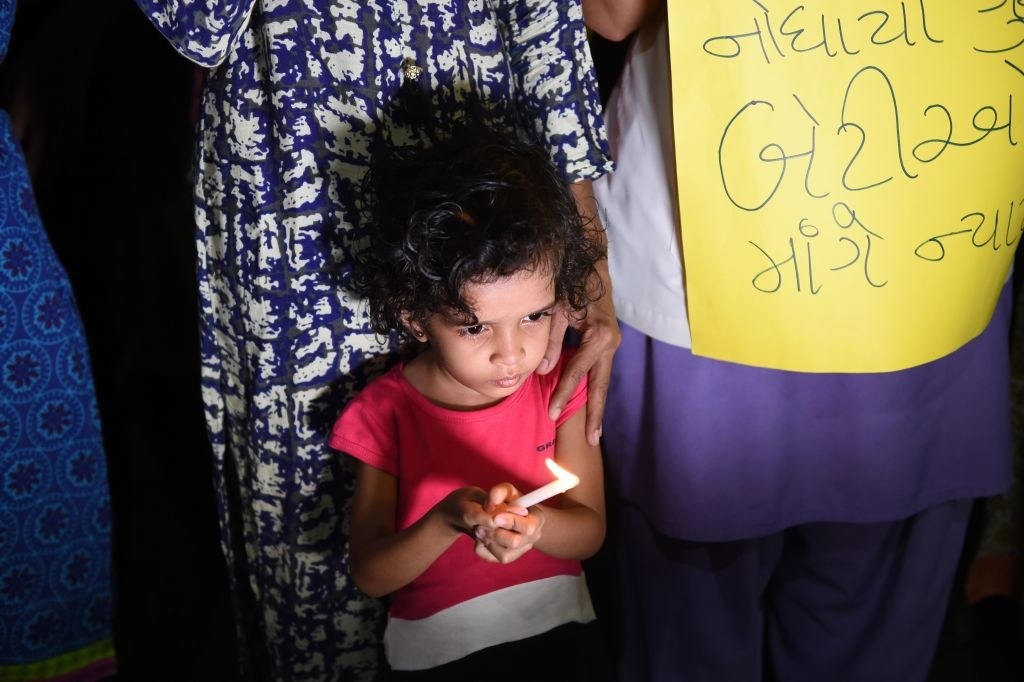
First, a confession: I avoid reading about the sexual abuse of little girls. I am a journalist, and I am glad to live in the age of #MeToo – I am all for public institutions holding men accountable for their assault of women and girls. But 10 years ago, my therapist and I decided it was important I walk away from the topic. It was imperative that I did. It was self-preservation.
As a woman who has made her career writing about the politics of gender, this dogged refusal to engage with this very specific category of stories has led to several raised eyebrows and barbed comments from editors and colleagues, early in my career. Most of them dismissed it as the eccentricities of an overprotected rich girl who couldn’t stomach the ugliness of real-life brutality. It was easier to allow the image to stick than to admit that I was constantly hovering close to nervous breakdowns and panic attacks, every time I was anywhere close to the subject.
It didn’t help that I started my career only a couple of years into my therapy. I’ve tried testing the waters a couple of times. Five years ago, I thought I was ready to face my demons, and attempted to organise an child sexual abuse awareness camp. It resulted in me having to take three months off of work to allow myself to heal. Then too, it was easier to pretend to be the flake who took off on a long vacation on a whim. As recently as last year, working on a story about a pre-teen rape victim sent me into a spiral of PTSD that took weeks to crawl out of.
I’ve spent so much of my life denying the existence of my horror that I’ve gotten really good at pretending. So good, in fact, that even my family never once suspected what was really going on with me.
I opened Twitter. There she was. Instagram. There she was. Facebook. There she was.
But, even with all my defenses in place, I couldn’t ignore the 8-year-old in Kathua.
I was perched on the cold, hard pleather seat of an airport’s waiting area, waiting to board a 17-hour-long flight. After almost a month of travel, I was returning home.
I was fiddling with my phone to pass the time, and I opened Twitter, as one does. There she was. Instagram – there she was. Facebook – there she was.
No matter how old, wise (or foolish) or well-versed in the art of subterfuge you get, certain truths of your life have a way of catching up when you least expect them to.
Some of my defenses protected me, still – some of the details I was able to stay unaffected by. But there was one word everywhere that unraveled me.
Eight.
She was eight.
Eight is so young to have experienced such a horrifying fate, pundits and anchors said. As if there is any age at which gang rape and murder become more welcome. But eight is a special number for me. I’ve been going to bed and waking up with it every day for the last 23 years, even when I didn’t always know it.
The last thing I remember is blood roaring in my ears in the airport waiting area. I remember my heart jack-hammering in my breast. I remember thinking that I should probably cry. And then I remember nothing.
Roughly 18 hours later, I stumbled out of the plane and onto a gently wobbly aerobridge in Mumbai, the flight attendants giving me strange looks, their brows slightly furrowed. The knot in my stomach told me I had not eaten a morsel for the entire duration of the flight. The emails in my inbox told me I had bought and exhausted an abnormal number of internet packs in the air. How many news reports, opinion pieces, shrieking social media lamentations and angry editorials had I read, chronicling the gang rape and murder with meticulous detail? I don’t know. I don’t remember any of it.
Once home, I spent 3 more days in a psychological blackhole, reading and rereading her story, allowing it to reacquaint me with memories I had repressed since I was – you guess it – eight.

As I slowly wake up from the stupor of the last 100 hours and finally remember the horrific details of that Kathua 8-year-old’s last days, I’m reminded of the few hours that, in many ways, signalled the end of my childhood as I knew it.
Like her, I was once eight. In her violations, I see my own.
Her purple dress with yellow flowers remind me of my pink pyjamas with little grey elephants. Her love of horses reminds me of my love of dogs. Her attacker led her astray with the promise of helping her find her lost horses. Mine gained my trust by promising me a puppy on my ninth birthday. She never saw her beloved horses. The child in me still awaits my puppy.
I was once eight. In her violations, I see my own.
They dragged her into a temple, a place that’s supposed to protect and preserve your goodness. I was defiled in a home filled with people who were supposed to protect me.
I read that she was drugged, repeatedly, to silence the sound of the horrors her body was being subjected to. It reminds me of the impossible weight of his palm pressed against my mouth.
I read that her mouth drew blood when they tried to strangle her, and I’m reminded of all the times I had to rush to the bathroom to washed away blood from my panties so my mother wouldn’t know.
I read that they killed her when she threatened to tell her parents everything. It was a threat I never made, pulling my pyjamas back up and scampering back off to bed when he was through. It makes me wonder what would have happened if I had. I didn’t know I could.
I read that they found her body with her eyes bulging, lips blackened and marks all over her face, and I think about waking up in a little pool of blood the next morning, and pretending I had wet the bed after I quickly washed the linen to remove every trace. I don’t know what went on in her head while it was all happening, and I still don’t have answers to why I chose to protect him for so many years.
I think of the adults who were in the same home as I was attacked, again, and again.
I read that a bunch of policemen were involved in covering up her rape. I think of the adults who were in the same home as I was attacked, again, and again, and again. I think of my attacker’s wife, who looks at me scared, and has never been able to meet my eyes. I never told her “our” secret, but I suspect she knows. I suspect she’s always known.
I read of her shocked and petrified mother and older sister, and I think of the day I told my own, not too long ago. I remember the shock, rage and grief. Replaced by a stoic acceptance because we know it’s a battle we will lose, one way or another. I understand their silence, because it mirrors my own.
I read how the noise around death has engulfed the country in raging political war, and I think about how my silence has brokered peace within the family. It was a silence so committed, and so complete, I spent a large part of my life not knowing what had happened to me even as I self-destructed under the weight of the burden I secretly carried. Until, that is, therapy helped me pry open the memories I had locked away deep into my psyche.
This tsunami of rage, grief, bleakness and tired hopelessness is impossible to sidestep. As one part of the country bristles in the aftermath of this unparalleled ugly, while the other makes the blood curdle and run cold with their ability to justify the gruesomeness as collateral damage in a religious and ideological war, I find myself clinging to one fragmented detail that makes me keep going back to Kathua. The shared age at which we lost our innocence. Unlike her, I got to keep my life.
Eight is an age when you’re too young to know what rape is, but know exactly what’s happening to you while it’s happening.
Eight is an age when you’re too young for your vocabulary to be properly equipped with words to explain what was done to you, but old enough for your mind and body to remember every excruciating detail.
I cried for her, for me, and for every little child who learned too young that their body can be ploughed and invaded.
Eight in an age when your thighs should hurt from the exertion of playing too much, not from having them roughly shoved apart by grown men old enough to be your father.
Eight is an age when you’re too young for the self-preservation instinct to have quite kicked in, too young to be suspicious of the uncles and bhaiyas swarming around you, but old enough to spend a lifetime wondering if there was any way you could have stopped it from happening.
Eight is too young to bear the burden of rape, but old enough to quietly shoulder it anyway.
This particular news story is brutal – she had no escape from behind those doors, locked in by goons. But eight-year-olds around India are raped routinely, in their own homes and schools and neighbourhoods, and despite not being physically locked away from safety, they are imprisoned by shame, by a lack of vocabulary to express what happened, by adults who are so opposed to looking at the men in they know as rapists that they would rather look away.
The last time I read the nightmare that emerged from Kathua, I finally allowed myself the tears the child in me never actually shed. I cried for her, and for me, and for every little child who learned too young that their body can be ploughed and invaded, so easily and without consequence, by weak men who will take power wherever they can get it.

